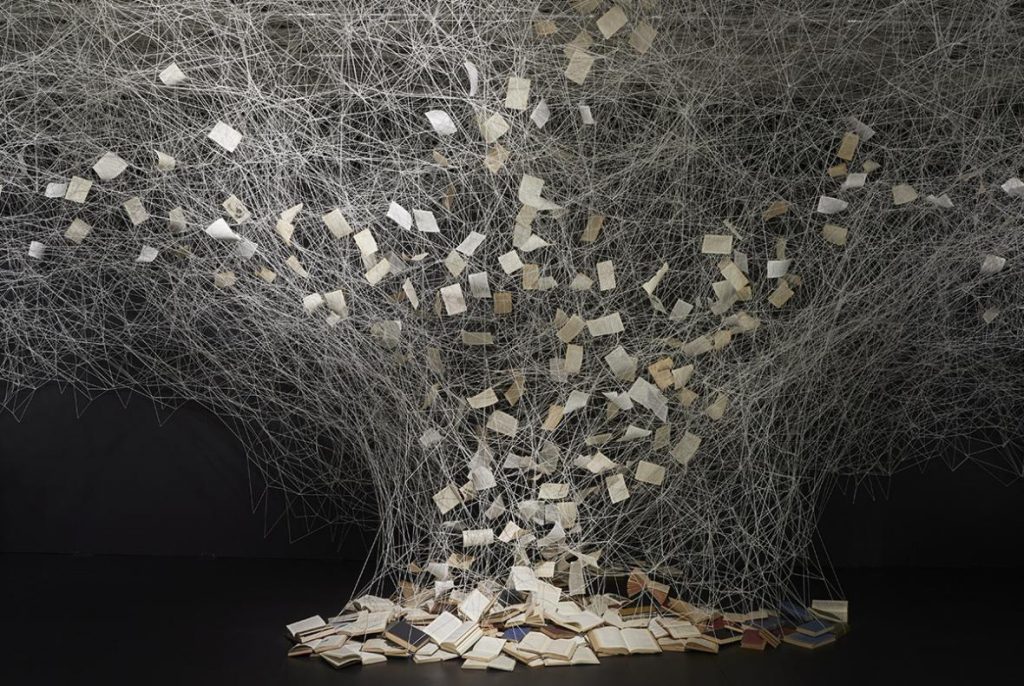The Philosophy Haiku of Kris McDaniel
Philosopher Kris McDaniel, who will be moving shortly from Syracuse University to the University of Notre Dame, writes philosophy haiku.
Haiku, a form of poetry that originated in Japan, traditionally are composed of 17 syllables over three lines, with 5 in the first line, 7 in the second, and 5 in the third.
Professor McDaniel says that “trying to write haiku about philosophy is a good philosophical exercise, since the form forces both brevity and creativity of expression.” He adds, “Regardless, they are fun to write.” He kindly gave me permission to post a few of them here.
Some are about Kant and his interpreters:
twelve categories
derived from forms of judgment?
or forced to fit them?
.
Jonathan Bennett:
Kant’s a phenomenalist
It’s all in the head!
.
Things we cannot see
still belong to possible
experiences
.
But McDaniel gives a number of other figures in philosophy the haiku treatment:
Descartes divided
the body infinitely
the mind not at all
.
all this you can doubt
your body, the world are lost
meditate again
.
Hume looked for himself
but could find no impression
No idea of “I”
.
Arithmetic fell
when Russell showed to Frege
a contradiction
.
Francis H. Bradley
had trouble with relations
and so lived alone
.
The worlds of Lewis
though merely possible
contain flesh and blood
More here.




Kris is awesome.
Kris McDaniel’s
own name is a terrific
start for good haiku.
Perhaps, on a weird reading of “McDaniel’s,” stretching the last syllable into two.
Yall’s mileage might vary.
Thomson imagined
a famous violinist —
embryonic thought
Simone de Beauvoir
conceives of womanhood as
something one becomes
Down trails with
elaborate signs—
Chisholm’s definitions
Best procrastination ever.
Brains cause, as do thoughts.
Overdetermination!
Reduction needed.
Metaphysics ain’t
quite enough for McDaniel
He writes haiku, too
Love of wisdom flies
Like a duck-rabbit on fire
It is exams week
Consciousness is here,
there, but not everywhere.
Suck it, panpsychists!
Sorry, I have nothing against panpsychists, but this just arose into my consciousness…
Parthood relations
of many varieties
bind things together
Modal realism
less counterintuitive
if overlapping
Quantification
is far less natural if left
without restrictions
Humean dictum:
preserves recombination,
can reshape all things
I once wrote a program that finds accidental haiku. Here are a few I have found in philosophical texts:
Snow falls, and is white;
the falling is a process,
the whiteness is not.
(Bertrand Russel, The Analysis of Mind)
No Grandfather, no
Father; no Father, no Tim;
no Tim, no killing.
(David Lewis, “The Paradoxes of Time Travel”)
The game, one would like
to say, has not only rules
but also a point.
(Ludwig Wittgenstein, Philosophical Investigations)
When I turn my eye
inward, I find nothing but
doubt and ignorance.
(David Hume, A Treatise of Human Nature)
Amazing. Thanks for sharing this.
Walk on by the pond
Atlas shrugs at Singer’s words
Just drown, baby, drown
Quine on what there is:
Regiment in FOL.
O’er what does x range?
Bang! Bang! Bang! Three holes?
Or primitive predicate:
‘Tri-perforated’?
Argle: holes exist
but are reduced to matter.
Holes are hole-linings.
Casati, Varzi
Perforated things have holes
made of space, not cheese.
Hope there is
philosophy owes
poetry a beer
With philosophy
You still don’t know but at least
you don’t know better.
Oh metaphysics!
When they try to kill you it’s
More metaphysics.
Wise Diogenes,
You man at one with nature,
Stop masturbating!
Let that beetle out!
Its wants to run and climb
and be referred to.
“I missed the last class.
Did we do anything, prof?”
“No. We just sat there.”
Shut up, Socrates!
A fool to die just when we
Needed his wisdom.
A cup with no tea.
A garden without flowers.
Think of objections.
“It’s greater than gold”
The philosopher told them.
“We’ll hoard it for you.”
You don’t seem to hear.
Or do I misunderstand?
So alone with you.
“I missed the last class.
Did we do anything, prof?”
“No. We just sat there.”
This one killed me. So good, but so true.
Arithmetic fell
when Russell showed to Frege
a contradiction
I don’t get that one!?! It was naive set theory that fell, not arithmetic, yes?
Goedel’s first surprise
reflecting on math, logic,
our innate limit
Is that a haiku?
Inspired by a quote
from Frege’s correspondence
With Bertrand Russell
http://www.oxfordreference.com/view/10.1093/oi/authority.20110803100434224
Kris has now made a
Haiku about a haiku
Somebody stop him!
I make my money
always going more meta
I can’t stop, won’t stop
Well, I was aware of the history and the quote, but I tend to agree with Solomon Feferman on the foundations issue! Besides that, from your link:
“. . . it undermined the attempt by the German logician and mathematician Friedrich Ludwig Gottlob Frege (1848–1925) to derive the whole of arithmetic from logic via set theory.”
Wishful thinking there, “the whole of arithmetic!”
Recently I invented a novel recursive elementary arithmetic which extends the “standard” model – something believed to be impossible. Granted, I used Aczel’s AFA with Maximal Bisimulation to establish set-theoretic foundations and I used standard set-theoretic techniques to construct the completion and closure, but when I think of these objects I think of sets of numbers not sets of sets!
You can think of my “Q-Naturals,” where Q stands for quanta, as the structure (N^2, ≤, +, *, (1, 0), (0, 0)) with lexicographic order, coordinate-wise addition, and multiplication defined by:
(a, b) * (c, d) = (a * c, a * d + b * c + b * d).
This definition of multiplication is actually consistent with coordinate-wise addition, which is to its advantage; – ) It is quite obvious that this structure is recursive and it is also quite obvious that these relations and operations can be generalized in countably many ways, leading to a countable subsumption hierarchy of recursive elementary arithmetics bound above by the Church-Kleene ordinal; what Frege called the “whole of arithmetic” is simply the zeroeth-order structure in this hierarchy. In the hands of someone like Feferman, I believe this development would be rather devastating to the whole Platonist argument; being first and foremost a Middle-way Buddhist, I find Platonism absolutely ridiculous!
In the event you may be interested, I prove what is necessary to establish that the first-order structure is an Unique Factorization Domain and confidently conjecture that every structure in the hierarchy is such; this has delightful implications for CS! Furthermore, while neither the completion nor closure are fields, due to zero divisors, they have already found applications, primarily in the generalizations of probabilistic measures they enable.
These two, Jon and John:
“Paradox is ambiguity
in contradiction.”
Is that a haiku!?!
What we need now is
To know what we do not know.
Socratic wisdom.
Subtle Cardano
ponders the order of things:
finds signs everywhere!
It was black and white.
And then it was more than that.
The wind cries “Mary.”